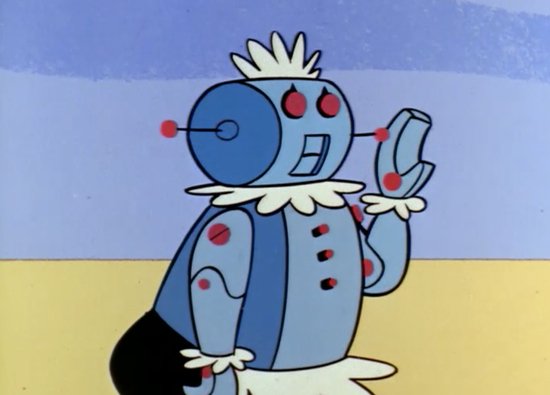Solving Problems with Robots
By: Christine Stonos
Time and time again people ask me what it is we do. I think people sometimes struggle to understand what we offer because it is an abstract idea; though not a completely new one.
Let’s imagine that you are the parent to three messy kids. You can’t stand the mess but are exhausted from the constant cleaning and tidying at the end of an already busy day. You’ve got a problem. You’re house is dirty and you don’t have the time to clean it.
Let’s also imagine that The Jetsons are real, and you have access to a robot maid named Rosey.
Rosey, the robot from The Jetsons.
You decide to hire Rosey the robot to do your cleaning for you. But Rosey doesn’t know where anything goes, nor does she know how you want your house kept clean. What would you do?
Well, first, you’d probably clean your house manually. You want to set a standard to teach Rosey what ‘clean’ looks like to you. You would put everything away in its place. You might need to implement a new organizational system or buy storage containers. This step could take a while, depending on how dirty or unorganized your house is. Especially if the previous methods you used to clean your house weren’t working, you might need to completely re-organize and develop a better system.
The second step would be to teach, or program, Rosey to clean up after the kids. You wouldn’t want her cleaning all the time, because the kids wouldn’t be able to play or do activities. You might set it up so that she cleans once or twice a day.
After Rosey the robot knows what to do, it’s just a matter of letting her go and do it. However, there might be another issue. If you’re not doing any of the cleanup, you may not notice when a toy is broken or missing. What if the arts and crafts supplies are running low? You might never know which toys your children are playing with, which ones they are bored of, or which ones they’ve outgrown.
At the end of the week, you could ask Rosey to give you that information. It is like an inventory report, but it would include other things. Information like how much time each of your children spends playing with each toy. Which toy is their favourite? Imagine how much you could learn about your kids and their habits by having this information. Christmas just got easier.
As I’m sure you’ve gathered, we don’t clean up houses or program robot maids. This metaphor is designed to help you understand what we can do to help you organize your business and your data.
Your business is your house and kids. We offer business solutions, meaning that we can ‘clean up’ and solve the problems in your business. This could be through the use of data and technology (like Rosey the robot cleaning up your house). But, if it’s a systems issue (your house is poorly organized and you don’t have enough storage space), you might not need Rosey. Maybe your house needs re-organizing. Maybe you need to teach your children to pick up their own toys and communicate their needs more effectively to you. Maybe you need a better system or methodology- that might be enough to solve your problem.
Even if there are no problems with the way your business is being run, there is still a good chance that there are areas that could be improved. Specifically, when it comes to data, automation is very much on the rise. About a third of businesses have fully automated at least one function in their business, and almost two-thirds of businesses are using automation for data reporting. The majority of small business owners say that automation is what allows them to compete with larger companies. Automation is only possible once you have a good system in place.
If you are cynical, I understand. If I told any parent with young kids that there was a way to keep their house clean all the time without having to do any of the work, they’d laugh at me.
That’s often the reaction that people have when I explain how we can improve or change their business. The logistics behind the ‘data-first method’ are still relatively new to many businesses, so fantastical claims promising to grow a business exponentially in under 5 years are often viewed as too good to be true. But this is a reality for many businesses who have made this shift.
Instead of having an employee spend six months to creating a report with your data, imagine if a robot could do it in a day. Think of how many other things that employee could be doing in those six months. Think of the time and money saved by having an efficient system that works. It’s not impossible, but it takes time and resources to set up the correct process. You can’t improve upon a bad process; sometimes you must scrap it and start over.
For all you business owners without robot maids, the next time you are cleaning your house, I challenge you to consider how easy the task would be if you had a robot maid like Rosey. Consider: How organized is your business? How clean is it? Or, perhaps it might be time for a little re-organizing to set it up to be functional and successful in the future.

